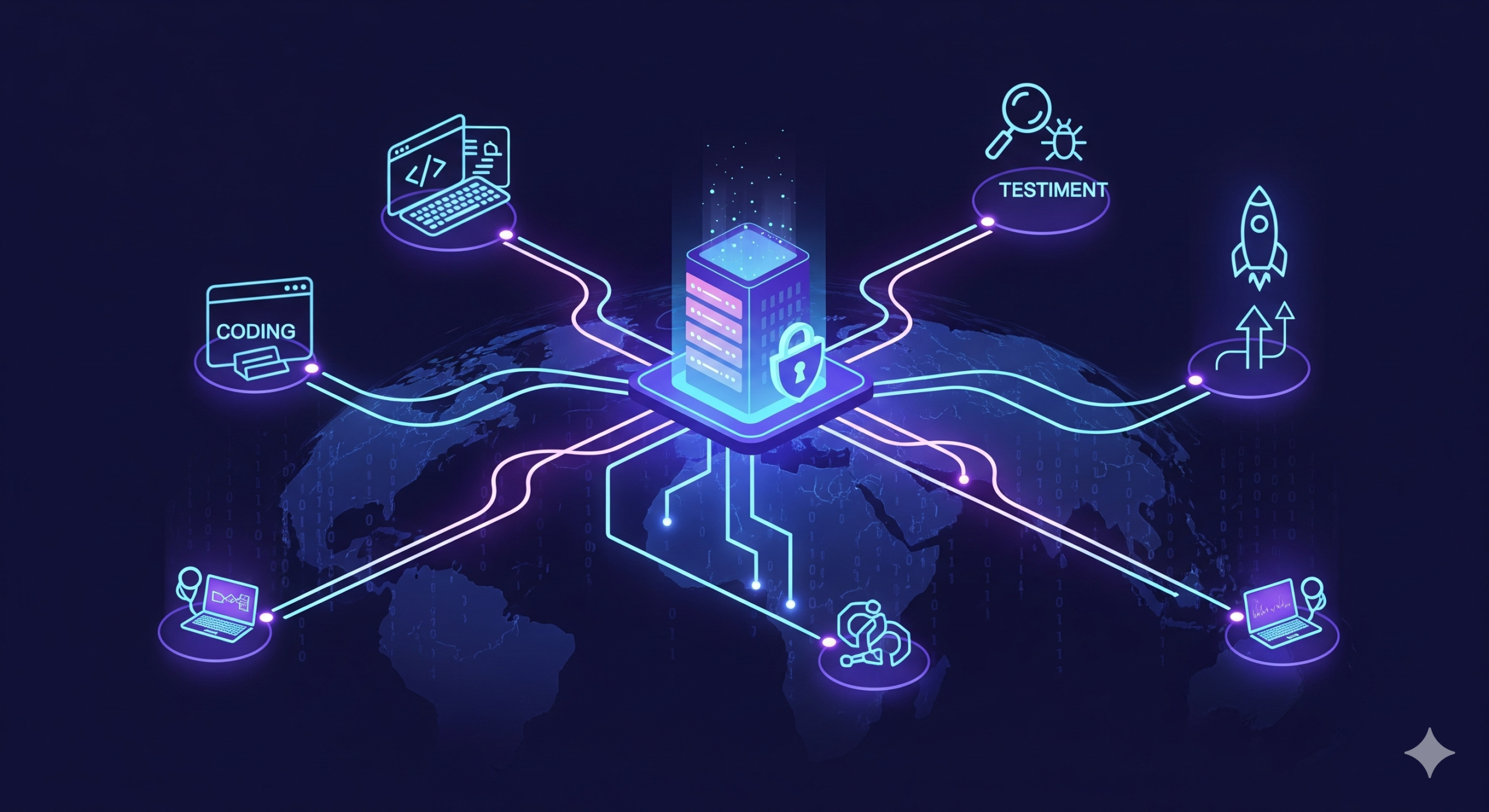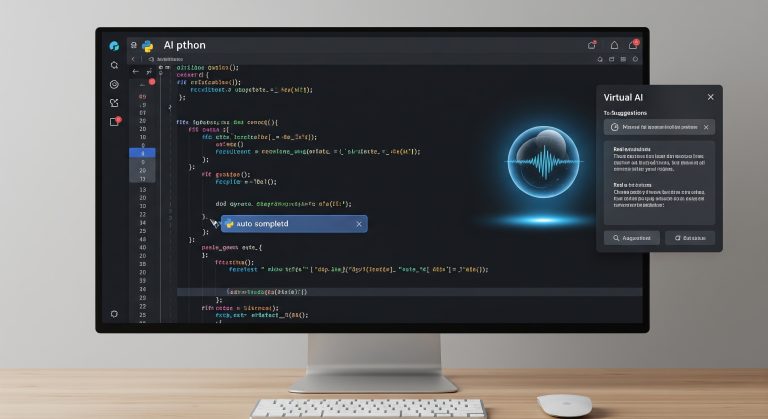Introduction
Establishing and managing an offshore development team requires a structured workflow and the integration of effective tools to ensure seamless collaboration and productivity. This guide outlines a step-by-step process, introducing essential tools—Okta, NordLayer, Slack, Trello, GitHub, and Zoom—aligned with each phase of your project’s setup and progression.

1. Initiating Secure Access and Identity Management
Before onboarding team members, it’s crucial to establish secure access protocols to protect sensitive information and ensure that only authorized personnel can access company resources.
- Okta: Implement Okta for identity and access management, providing secure authentication and authorization services. Okta’s integration capabilities allow seamless connection with various applications, facilitating unified access control. By centralizing user authentication, Okta reduces the risk of security breaches and simplifies the login process for team members.
- NordLayer: Utilize NordLayer to establish secure remote connections through virtual private networks (VPNs). NordLayer offers integration with Okta for streamlined user provisioning and access management, enhancing overall security. This integration ensures that as team members are onboarded or offboarded, their network access permissions are automatically updated, maintaining strict security protocols.
2. Onboarding Team Members and Establishing Communication Channels
Once secure access is in place, focus on onboarding team members and setting up effective communication channels to facilitate collaboration.
- Slack: Create a dedicated Slack workspace for your team, organizing channels based on projects, departments, or topics to keep conversations focused and organized. Integrate Slack with Okta for simplified user management and secure access. Slack’s real-time messaging capabilities, along with features like file sharing and searchable archives, make it an ideal platform for maintaining clear and continuous communication among team members.
3. Organizing Tasks and Project Management
With communication channels established, organize tasks and manage project workflows to ensure clarity and accountability.
- Trello: Set up Trello boards corresponding to different projects or teams. Within each board, create lists to represent stages of the workflow (e.g., To Do, In Progress, Done) and cards for individual tasks. Assign tasks to team members, set due dates, and attach relevant documents or links. Integrate Trello with Slack to receive updates and notifications directly within Slack channels, keeping everyone informed in real time. This integration allows team members to add new Trello cards from Slack, join Trello cards and boards, and change due dates, streamlining the task management process.
4. Collaborative Development and Version Control
For development teams, implementing version control is vital to managing code changes and collaboration effectively.
- GitHub: Host repositories on GitHub to enable collaborative coding, code reviews, and issue tracking. Integrate GitHub with Slack to receive notifications about commits, pull requests, and issues, ensuring that the team stays updated on codebase changes. This integration facilitates immediate awareness of code updates, allowing for prompt reviews and discussions, which is crucial for maintaining code quality and project timelines.
5. Scheduling Meetings and Real-Time Collaboration
Regular face-to-face interactions, or even virtual ones, help build rapport and clarify complex topics.
- Zoom: Schedule regular video conferences for team meetings, project discussions, and one-on-one check-ins. Use Zoom’s features like screen sharing and breakout rooms to enhance meeting effectiveness. Integrate Zoom with Slack to start or join meetings directly from Slack channels, streamlining the scheduling process. This integration allows team members to initiate Zoom meetings using simple commands within Slack, reducing the time and effort required to set up meetings.

6. Automating Workflows and User Provisioning
To enhance efficiency, automate routine tasks and user provisioning processes.
- Okta Workflows: Utilize Okta Workflows to automate user provisioning and de-provisioning, ensuring that team members have appropriate access to necessary tools and resources. For example, automatically add new employees to relevant Slack channels and Trello boards upon onboarding. This automation not only saves time but also reduces the risk of human error in the access management process.
7. Monitoring Progress and Performance
Regular monitoring and reporting help in tracking progress and identifying areas for improvement.
- Dashboards and Analytics: Use Trello’s reporting features or integrate with third-party analytics tools to monitor task completion rates, identify bottlenecks, and assess team performance. Share these insights during Zoom meetings to discuss and implement necessary adjustments. Additionally, GitHub’s integration with Slack can provide real-time updates on development progress, allowing for proactive management of the development pipeline.
8. Implementing Best Practices for Offshore Collaboration
Beyond integrating the right tools, adopting best practices is essential for successful offshore collaboration.
- Clear Communication Protocols: Establish guidelines for communication, including expected response times, preferred channels for different types of messages, and protocols for meetings. This ensures that all team members are on the same page and reduces misunderstandings.
- Regular Check-Ins: Schedule regular check-ins using Zoom to discuss progress, address challenges, and provide feedback. Consistent meetings help in maintaining alignment and fostering a sense of team cohesion despite geographical distances.
- Cultural Sensitivity: Be mindful of cultural differences and time zone variations. Encourage an inclusive environment where team members feel valued and understood, which can enhance collaboration and productivity.
- Documentation: Maintain comprehensive documentation of processes, decisions, and project changes. This practice ensures that all team members have access to the same information, facilitating transparency and continuity.
Conclusion
Effective offshore collaboration relies heavily on the strategic implementation of various tools and technologies. By leveraging communication platforms like Slack and Zoom, project management tools such as Trello and Asana, version control systems like GitHub, and robust security measures including NordLayer and Okta, startups and SMEs can ensure seamless and secure collaboration with their offshore teams. Integrating these tools not only enhances productivity and efficiency but also fosters a collaborative culture that transcends geographical boundaries, positioning businesses for success in the global marketplace.
About DigiEx Group
DigiEx Group is a leading Tech Talent Hub and AI-driven Software Development company in Vietnam, backed by over 20 years of global IT experience. Our team, with 2 Tech Development Centers, 150 in-house engineers, and a network of 50+ domain experts, tailors every engagement to your unique roadmap with a suite of services:
- Tech Talent Services: Rapid access to Vietnam’s top 2,000+ pre-vetted engineers via our Talent Hub platform.
- Custom Software Development: End-to-end product delivery for web, mobile, SaaS, and enterprise systems.
- AI Consulting & Development: Design and implementation of AI Agents and automation solutions.
- Neobank & Fintech Solutions: Cutting-edge digital banking and payment platforms.





